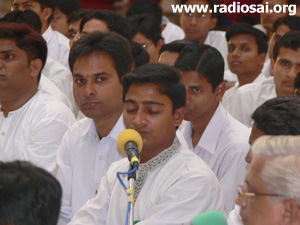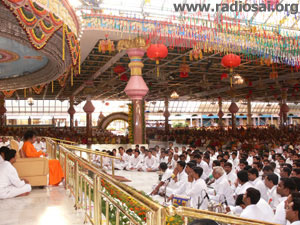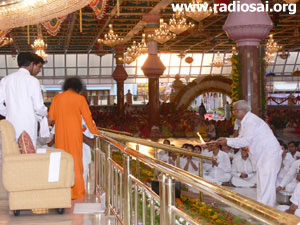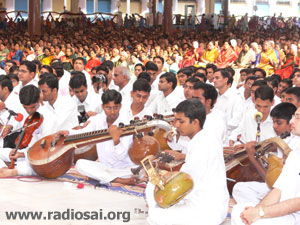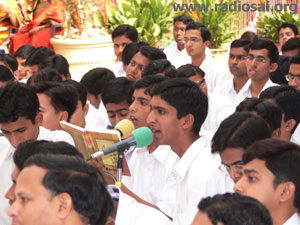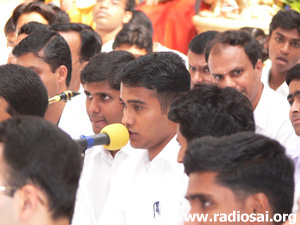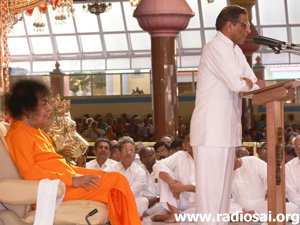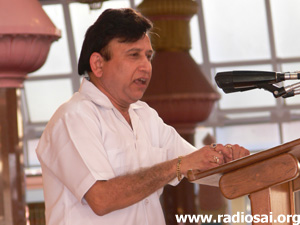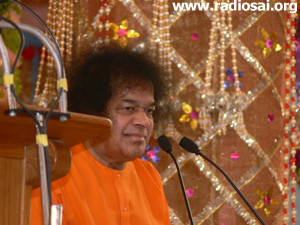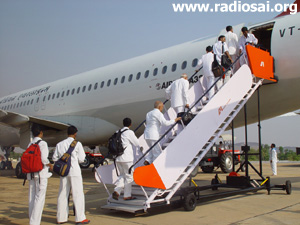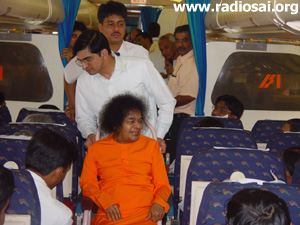 |
 |
 |
| Volume 4 - Issue 05 MAY 2006 |
|
PRASHANTI DIARY CHRONICLES OF HEAVEN ON EARTH One of the problems we face when writing these chronicles is to decide on what we call the “cut-off” date. In the early days of Heart2Heart we had to cut it off quite early (by the 20th of the month) as we had to package all the articles and send it to a company in Bangalore that was helping us lay it out in the format of the Heart2Heart magazine that you are all familiar with. This always left us feeling a little unsatisfied, as quite a few of the major festivals (like the Birthday celebration on November 23rd, as an example) fall during the last ten days of the month. Hence we could include a report on these events only the following month and as much as forty days late! But over time we have built up enough expertise “in-house” so that we now have a bit more control over the cut-off date and can include events which occur even in the last week of the month. Case in point: the 80th Birthday celebrations were covered in full and included in the December 1, 2005 issue. The festival of Ugadi, which fell on March 30th this year, threw us new challenges. After a full day of covering the event, i.e., taking notes and photographs of the morning and afternoon sessions, would we be able to include it and bring out the magazine in time, which meant loading it by midnight of the 31st, a mere twenty-four hours later? This is where teamwork came into play. Everyone chipped in and did more than their share and with Swami's grace we managed to not only complete a full write-up of the events, but also selected, cleaned and captioned the pictures that supported the text in Photoshop, listened to and transcribed the Divine Discourse and selected excerpts for inclusion, found someone late in the night to translate the section on the panchanaga smaranam from Telugu to English (from the students’ skit in the evening) and then finally laid it all out using a software program called Dreamweaver. All the hard work paid off, as last month’s issue came out on the morning of April 1, complete right up to the events that happened on March 30. And this is in addition to the heavy foot traffic we face on holidays when we have numerous visitors with myriad questions and urgent requests. In spite of all this there was one special event that happened on March 31 in connection with the celebration of the Ugadi festival that we just could not include in the last issue: a cultural program of melodious Telugu group songs March 31 and April 1st 2006: Cultural Programmes By The Vizag Group
"Maa Swami Paaadalu Mahi Mahite Vedaalu" (the Lotus Feet of our Lord are the very essence of scriptures on this earth), was followed by "Pudami Paina Purushottamudu" (the Supreme Lord has taken birth on earth and Puttaparthi has become a land of holy pilgrimage.) "Jai Jai Sai Ram, Jai Jai Sai Ram" proclaimed the Lord of the Universe has come down as Sathya Sai and is molding humanity to attain great heights and establish Sathya, Dharma, Shanti, Prema and Ahimsa (truth, righteousness, peace, love and non-violence).
A haunting solo song (the only one for the evening) called "Siva Siva Sankara" declaring that O Siva, You can be owned only by Your devotees, was followed by the final group song of the evening – a lullaby on Sathya Sai ("Sayini Vuyalu Loopandi"): Let us cradle the little Sai
At the conclusion of the set of songs selected for the evening, Swami called up the Music Director and told him that Swami is very happy with the singing, the singing was full of expression. See the atmosphere [in Sai Kulwant Hall] has changed and all the people are happy. That is good, singing with devotion. “Swami likes it. Swami is very happy. Sing tomorrow also”. The Music Director humbly said, “Swami, it is all Your grace. I am only an instrument”. To this Swami replied, “Yes, you have written with that feeling in your heart. That is why it is so good”. Swami then released a book in Telugu entitled Salutations in Words to the Universal Lord before arathi was taken at the end of the concert.
Here this is Prashanti Nilayam, the abode of Siva Sakhthi Swarupa and the heaven where God walks in human form. 2. "Edesa Megina Ebhasha Palikina" Whichever country you come from or whichever language you speak, there are the glories of Sathya Sai, the leelas of Sathya Sai, the miracles of Sathya Sai. 3. "Andaru Devudu Sairamudu" Sai Rama is God to everyone. The God of Gods Who protects by giving the Abhaya Hasta (the blessing of fearlessness by raising the Divine Hand). 4. "Sayee Anu Kamman Pilupe" The sweet name of Sai makes us remember a loving mother, and the sweet thoughts of Sai enchant even the mother. 5. "Sayirama Nauka Saagi Pothunnadi" The boat of Sai Rama is sailing on. The Sai Krishna boat is cruising along in which the rudder is Sai and the force that makes the boat move is the sweet name of the lord. 6. "Parthi Pureesuni Choodaramo Paramaathmudocchadu Padarammo" Hail the Lord of Parthi, the Universal Lord has come riding on the palaku (palanquin), the Lord has come to ward off our sin. While the bhajans were being performed, Swami got up from His throne and stood close to the singers sitting in the front rows. He asked for the notebook in which the group leader Sri Prakash Rao had written his compositions and asked that songs be sung from that book. The following conversation took place between Sri Prakash Rao and Swami in Telugu and we reproduce it here as related to Heart2Heart by Sri Prakash Rao: Swami: Who has written these songs? Prakash: It is You Swami, it is Your Grace. I am only an instrument. I held the pen and You wrote them. Swami: You have written with that feeling in your heart and that is why they are so good. Swami liked them. I am happy. Prakash: Swami, these songs are being sung during the medical camps held in the villages during grama seva. Swami: I know. That is very good. They inspire people. Swami then created a navarathna ring (a ring studded with nine gems) and put it on the ring finger of Sri Prakash Rao. Swami: See these are navarathnas. It correctly fits on your finger. Swami is always correct.
Swami then allowed everyone in the group to take padnamaskar. April 7: Ramanavami Celebrations In Sai Kulwant Hall Ramanavami, or the birth anniversary of Lord Rama, is a major festival celebrated all over India by devout Hindus. Rama, the seventh incarnation of Lord Vishnu, was born on the ninth day after the new moon (hence the term Navami, which means the ninth). He was thus born in the bright half of the Indian month of Chaitra (which normally falls during March and April) in the city of Ayodhya, in the Treta Yuga, the SecondAge. Ramanavami is a festival which is typically celebrated in Brindavan, for Swami is usually there during the hot months of the year. For the past two years, however, Swami has chosen to remain in Puttaparthi after Sivarathri so the devotees in Puttaparthi had the rare honour this year to pay homage to Lord Sai Rama on the occasion of His birth anniversary.
Following this was "Endaro Mahanu Bhuvalu" in Sri ragam and Adi talam. This song is one of the five gems of Sri Thyagaraja Swami. Next came "Paluke Bangaramayeera" in Anandabhairavi ragam and Adi thalam which is a famous song written by Bhaktha Ramadas. "Brahman Okate" in Bhowli ragam, Adi talam, a keertanam by Sri Annamacharya, followed where he states God is one and conveys the advaita bhavam in the song.
The young veena players were K. Bhardwaj, V.N.S. Bhaskar, B.N. Shiva Sai, and M. Gopalakrishna. Violin accompaniment was provided by Krishna Uday while Sudheerkumar and Hari Vijay Ram accompanied them on the mridangam and Mohan Kumar played tabla. At Swami’s request three carnatic vocal numbers were sung by Sri Jyoteeswaran, lecturer in Vocal Music. "Brovabharama" in Adi talam, Bahudar ragam was the first song (originally written by Sri Thyagaraja) where he wistfully asks Lord Rama, “Is it difficult for You to save me?” This was followed by "Ramanamamu" in Adi talam, Athana ragam, another Thygaraja composition, and the final vocal song, also a keertanam by Thygaraja, called "Nagumomu" in Adi talam, Abheri ragam.
After this, at Swami’s request, there was a Rama Katha in Hindi sung by Kaustab, Abhijith Sikote and Gopinath Padi. They also sang a favourite Meera bhajan “Payo ji maine rama rathan dhana payo”. They were accompanied by Abhishek on the tabla, Sanket Modi on the harmonium, and Raghavan on the Naal.
After Sri Ajit Poppat’s speech, to everyone’s delight Swami signaled that the table be brought so He could deliver His Divine Ramanavami discourse. Swami said:
Then addressing students He said:
Thus concluded another memorable Ramanavami, this time held in Sai Kulwant Hall. The whole ashram was now abuzz with the word that Swami will shortly leave for His playground, Kodaikanal. Bhagavan Leaves for Kodaikanal On April 9, with an entourage of 60 students, staff and guests, Swami left Parthi for Kodaikanal on a chartered flight to Madurai, where He blessed many hundreds of devotees. He then traveled by road to the elevated cooler climes of the hill resort of Kodaikanal.
Dear Reader, it has not been possible for us to get pictures and stories of Swami’s Kodai trip in this issue. We will bring you a detailed report with pictures of Swami’s visit and stay in the emerald hills of Kodaikanal in the next issue.
– Heart2Heart Team |
| You can write to us at : h2h@radiosai.org |
Vol 4 Issue 05 - MAY 2006
|
Best viewed in Internet Explorer - 1024 x 768 resolution. |
DHTML Menu by Milonic. |



